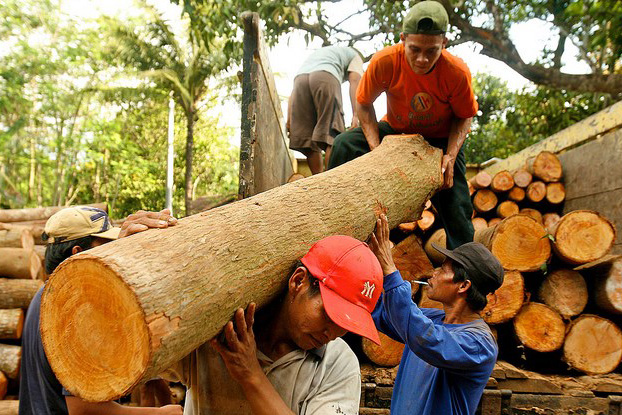
By Herry Purnomo, originally published at CIFOR’s Forests News
Shortly after the British people voted on June 24 to leave the European Union, the country witnessed a change of prime minister and economic uncertainties radiated around the globe.
For timber traders and advocates of environmental sustainability in Indonesia, this development was a major concern. The country was about to clear the final hurdle toward getting the Forest Law Enforcement, Governance and Trade (FLEGT) license for its timber trade. The license would allow Indonesia’s timber to enter the EU easily, bypassing strict EU timber regulation requirements.
This was made possible in April, when President Joko “Jokowi” Widodo met European Commission president Jean-Claude Juncker in Brussels and agreed to smoothen the FLEGT licensing path for Indonesian timber.
The repercussions of Brexit may affect the terms of this licensing, but what is its likely impact on timber legality and the sustainability of forests in Indonesia? Sustainability and legality are main issues in managing forest and timber products; timber legality was thus discussed at the recent Asia-Pacific Rainforest Summit held in Brunei from Aug. 3 to 5.
These issues are especially a concern in Indonesia, which has 69 million hectares of production forest, of which 36 million hectares are under forest concession permits. The 1945 Constitution mandates that Indonesia manage its forest and natural resources sustainably.
However, after 20 years of certification processes, Indonesia has only 5 million hectares of certified production forest under the Forest Stewardship Council (FSC), the Eco-labeling Institute (LEI) and the Program for Endorsement Forest Certification (PEFC) as stated by the Indonesian Forest Certification Forum, but these voluntary schemes have not worked optimally to create sustainable forests.
In 2003 the government initiated a mandatory Timber Legality Assurance System (SVLK) to reduce illegal logging — the result of an agreement between Indonesia and the EU. Currently, 4.6 million hectares of concessions, 500,000 hectares of community forest and 1,908 timber industries have been SVLK-certified.
With Brexit, there will be at least two types of impact on Indonesian forests: economic and political.
Economists predict Brexit will slow down the UK economy as well as those across the EU and China. Indonesia’s timber exports to the EU reached US$609 million in 2015, but with Brexit they could shrink by 2 percent, $12 million, this year.
It could see additional reduction if Chinese demand for Indonesian timber drops, as China is the main timber exporter to the EU. This is not the whole story. The domino effect of a Brexit fallout can lead to conservative spending and cutbacks that could see reduced investment in Indonesia’s timber industry.
If this happens, the government’s optimism in being able to raise exports of its timber products such as furniture, pulp and paper and plywood, valued at $11 billion through FLEGT licensing could now be a dream. Jokowi, a former furniture businessman, had an ambitious plan to boost furniture exports from $1.8 billion to $5 billion in 2020.
If realized, it would improve the livelihoods of millions of small-scale furniture producers and craftspeople in a country where 98 percent of furniture making is done by small and medium enterprises.
The UK, as a main sponsor of the SVLK initiative through its multi-stakeholder forestry program, is a strong supporter of this program in Indonesia. As a result, Indonesia benefitted from the significant backing of EU countries, led by the UK, in the FLEGT process.
After Brexit, there are doubts about the UK’s political influence to push through this FLEGT licensing process among SVLK stakeholders in EU member states by the end of this year.
WHAT CAN INDONESIA DO?
First, Indonesia should continue to improve forest governance regardless of international assistance and pressure; this can be understood as working toward stipulations in the 1945 Constitution to implement sustainable development.
Second, Indonesia can provide more support for forest certifications such as the FSC, LEI and PEFC that are independent of a state or bloc.
The government needs to endorse voluntary forest certification by providing more economic incentives to those certified, which could then attract others to join the process. More funds need to be allocated to help small-scale forestry comply with FSC, LEI and PEFC standards.
Encouraging more investments into sustainable practices will boost exports of forest products to meet Jokowi’s goals and support the millions working in small and medium scale enterprises.
Third, talk with the UK on its timber market to manage the impact of Brexit and deepen engagement with Germany and France to access the timber legality market in the EU. Since timber legality is required by many countries, there could only be more incentive for Indonesia to obtain global recognition for this.
Timber legality is just one step toward ensuring the sustainability of Indonesia’s forests and reducing carbon emissions, conserving biodiversity and improving the livelihoods of forest-dependent people.’
*This article was originally published in the Jakarta Post.











